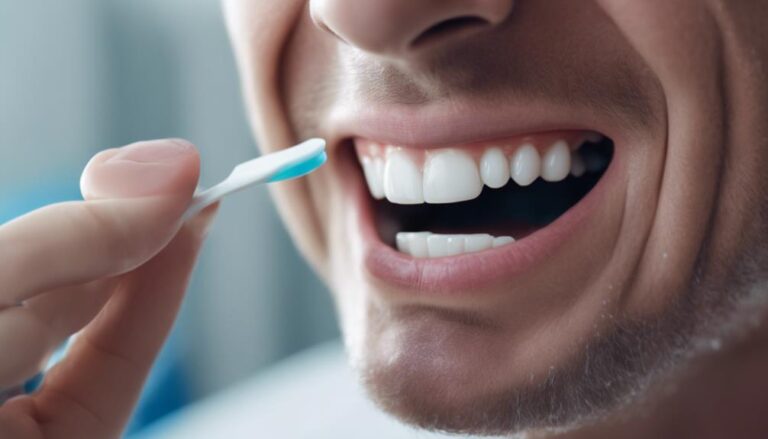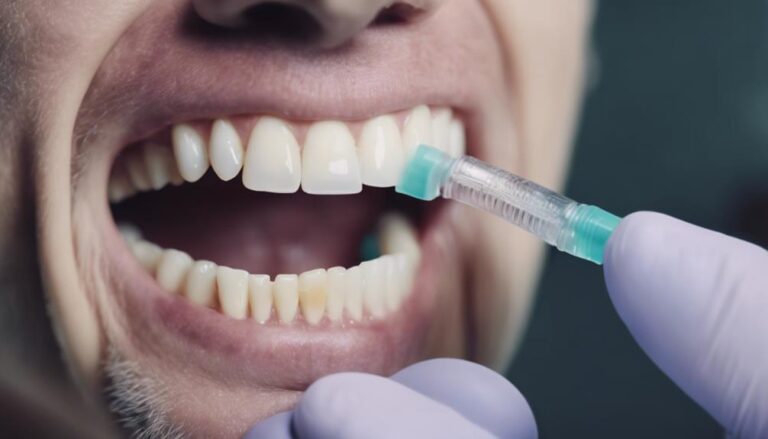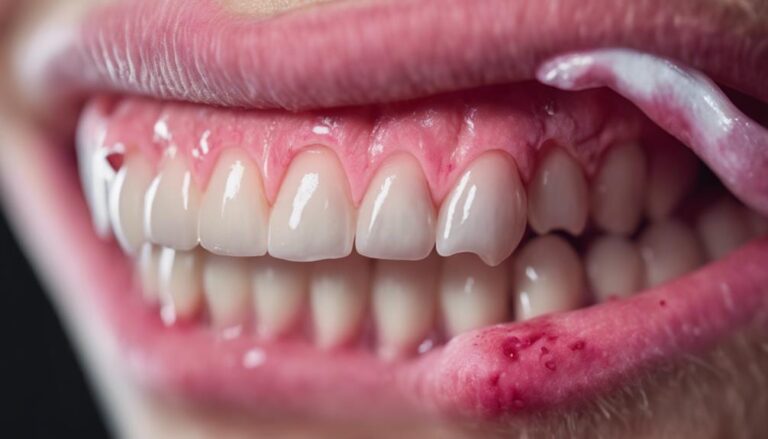I’ve researched top remedies for combating bad breath and gum disease. Try minty mouthwash to freshen breath and fight bacteria. Consider oil pulling with coconut or sesame oil to remove toxins and reduce gum inflammation. Aloe vera has anti-inflammatory properties that promote gum health. Vitamin C rich foods like oranges aid in preventing gum disease. Tea tree oil targets harmful bacteria and freshens breath. Herbal mouth rinse with peppermint and tea tree oil is a natural breath freshener. Hydrogen peroxide rinse kills bacteria and supports gum healing. Green tea antioxidants reduce inflammation and plaque buildup. Coconut oil pulling fights bacteria and reduces gum inflammation. Turmeric’s anti-inflammatory properties provide relief for gum inflammation. Cranberry juice’s polyphenols fight gum disease bacteria and promote fresher breath. These remedies can greatly improve oral hygiene and gum health.
Key Takeaways
- Mouthwash with minty freshness combats bacteria for fresher breath.
- Oil pulling with natural oils removes toxins and reduces gum inflammation.
- Aloe vera’s antibacterial properties support gum health and wound healing.
- Vitamin C rich foods fight harmful bacteria and aid in preventing gum disease.
- Tea tree oil reduces inflammation, freshens breath, and combats bacteria.
Mouthwash for Bad Breath
Using a minty mouthwash can help freshen breath and combat the bacteria that cause bad breath. However, it’s essential to remember that mouthwash isn’t a substitute for good oral hygiene practices.
Alongside using mouthwash, incorporating a routine of tongue scraping and flossing can further enhance the benefits of fresh breath. Tongue scraping helps remove the layer of bacteria that can accumulate on the tongue, contributing to bad breath. Flossing, on the other hand, eliminates food particles stuck between teeth that can also harbor bacteria responsible for halitosis.
Additionally, gum massages can improve circulation in the gums, promoting overall gum health and reducing the likelihood of gum disease, another common cause of bad breath. Staying hydrated is important for saliva production, which acts as a natural mouthwash, washing away food particles and bacteria. Ensuring adequate hydration levels can significantly contribute to maintaining fresh breath throughout the day.
Oil Pulling Benefits
To further enhance oral health and combat bad breath, exploring the benefits of oil pulling can be a valuable addition to one’s daily routine. Oil pulling is an ancient Ayurvedic practice that involves swishing oil around in your mouth to remove bacteria and promote oral hygiene. While scientific research on oil pulling is limited, some studies suggest that it can reduce harmful bacteria in the mouth and improve overall oral health.
| Benefits of Oil Pulling | Description |
|---|---|
| 1. Oral Hygiene | Oil pulling helps to remove bacteria and toxins from the mouth, potentially reducing bad breath and improving overall oral health. |
| 2. Natural Remedies | Using natural oils like coconut or sesame oil for oil pulling can be a safer alternative to chemical-based mouthwashes, promoting a more natural approach to oral care. |
| 3. Teeth Whitening | Some proponents claim that oil pulling can help whiten teeth by reducing plaque and bacteria that cause staining. However, more research is needed to confirm this benefit. |
| 4. Gum Health | Oil pulling may help reduce inflammation in the gums and prevent gum disease by eliminating harmful bacteria that can lead to periodontal issues. |
Incorporating oil pulling into your daily routine as part of your oral hygiene regimen may offer natural benefits for your overall oral health.
Aloe Vera for Gum Health
Aloe Vera has shown promising potential in promoting gum health through its anti-inflammatory and antibacterial properties. When it comes to gum care and oral health, Aloe vera remedies can be a natural and effective option. Here are four key benefits of using Aloe vera for gum health:
- Anti-inflammatory properties: Aloe vera contains compounds that help reduce inflammation in the gums, which can be beneficial for those with gum disease.
- Antibacterial effects: The antibacterial properties of Aloe vera can help combat harmful bacteria in the mouth that contribute to gum issues.
- Promotes healing: Aloe vera has been known to promote tissue repair and wound healing, which can aid in treating gum problems.
- Soothing effects: The cooling and soothing nature of Aloe vera gel can provide relief to irritated gums and alleviate discomfort.
Incorporating Aloe vera into your oral care routine may offer a natural way to support gum health and combat gum disease.
Vitamin C Rich Foods
Consuming foods rich in Vitamin C is vital for maintaining healthy gums and overall oral health. Vitamin C is an antioxidant that plays an important role in gum health by supporting collagen production and fighting off harmful bacteria that can lead to gum disease. Citrus fruits like oranges, lemons, and grapefruits are excellent sources of Vitamin C and can aid in the prevention of gum disease.
Here is a table highlighting some Vitamin C-rich foods:
| Food | Vitamin C Content (mg) |
|---|---|
| Oranges | 70 |
| Strawberries | 58 |
| Kiwi | 71 |
In addition to consuming Vitamin C-rich foods, supplement options are available for individuals who may require higher doses for healing properties. Vitamin C supplements can be beneficial for those with gum inflammation or periodontal disease. However, it is essential to consult a healthcare provider before adding supplements to your routine to determine the appropriate dosage for your specific needs.
Tea Tree Oil Benefits
Exploring the benefits of Tea Tree Oil reveals its potential in promoting oral health alongside Vitamin C-rich foods. Tea tree oil, known for its antibacterial properties, can be a valuable addition to your oral hygiene routine. Here are some key benefits and uses of Tea Tree Oil in the field of natural remedies for gum disease prevention:
- Antibacterial Action: Tea tree oil effectively targets harmful bacteria in the mouth, reducing the risk of gum disease.
- Anti-Inflammatory Properties: It helps to reduce inflammation in the gums, aiding in their health and overall oral hygiene.
- Fresh Breath: Tea tree oil’s ability to combat bacteria can help freshen breath and alleviate bad breath concerns.
- Easy to Use: Whether added to homemade mouthwash or applied directly to the gums, incorporating tea tree oil into your routine is simple and effective.
Probiotics for Oral Health
Research suggests that incorporating probiotics into your oral hygiene routine may offer benefits for maintaining a healthy mouth. Probiotics are live bacteria and yeasts that are good for your health, especially your digestive system. When it comes to oral health, probiotics can help in various ways, such as balancing the oral microbiome, reducing harmful bacteria, and promoting overall oral health.
Below is a table summarizing some of the key benefits of probiotics for oral health:
| Probiotic Benefits | Description | Evidence |
|---|---|---|
| Balancing Oral Microbiome | Probiotics help maintain a healthy balance of bacteria in the mouth, which can prevent issues like bad breath and gum disease. | Research published in the Journal of Applied Microbiology. |
| Reducing Harmful Bacteria | Probiotics compete with harmful bacteria for space and nutrients, inhibiting their growth and promoting a healthier oral environment. | Study in the Journal of Clinical Periodontology. |
| Promoting Oral Health | Probiotics may contribute to the prevention of oral diseases, including cavities and gingivitis, by supporting the natural defense mechanisms of the mouth. | Clinical trials at the University of Washington School of Dentistry. |
Baking Soda Benefits
Incorporating baking soda into your oral care routine can provide various benefits for maintaining oral hygiene and freshness. Baking soda, also known as sodium bicarbonate, possesses properties that make it a useful addition to your dental care regimen. Here are some key benefits of using baking soda:
- Baking soda whitening: Baking soda is mildly abrasive, which can help remove surface stains on teeth, leading to a brighter smile.
- Baking soda sensitivity: Due to its gentle abrasive nature, baking soda can be a suitable option for individuals with sensitive teeth as it may cause less sensitivity compared to some commercial whitening products.
- Neutralizing acids: Baking soda can help neutralize acids in the mouth, reducing the risk of enamel erosion and cavities.
- Freshening breath: Baking soda can help combat bad breath by neutralizing odors and creating a fresher oral environment.
Incorporating baking soda into your oral care routine, whether through toothpaste or homemade mouthwash, can be a cost-effective and beneficial way to support your overall oral health.
Herbal Mouth Rinse
An herbal mouth rinse can be a revitalizing and natural addition to your oral hygiene routine, offering benefits beyond traditional mouthwashes. Herbal mouthwashes are known for their natural breath fresheners and have been used for centuries to promote oral health. These rinses often contain ingredients such as peppermint, tea tree oil, and eucalyptus, which have antimicrobial properties that can help combat bad breath and reduce bacteria in the mouth.
One of the key benefits of using an herbal mouth rinse is that it doesn’t contain alcohol or artificial chemicals, making it a gentler option for those with sensitive gums. Additionally, herbal mouthwashes can help soothe gum inflammation and promote overall oral health. Some herbal ingredients also have astringent properties that can help tighten gum tissues and reduce the risk of gum disease.
Incorporating an herbal mouth rinse into your daily oral care routine can provide a rejuvenating and natural way to maintain fresh breath and support gum health.
Hydrogen Peroxide Rinse
To enhance your oral health regimen, consider utilizing a hydrogen peroxide rinse as a beneficial addition to your daily routine. Incorporating this simple step can aid in gum disease prevention and promote oral hygiene effectively at home. Here are four key benefits of using a hydrogen peroxide rinse:
- Antibacterial Properties: Hydrogen peroxide can help kill harmful bacteria in the mouth, reducing the risk of gum disease.
- Whitening Effect: It may assist in whitening teeth by eliminating surface stains.
- Improved Healing: Hydrogen peroxide can support the healing of minor gum irritations and sores.
- Cost-Effective Solution: Compared to many commercial oral care products, hydrogen peroxide is a more budget-friendly option for maintaining oral health.
Integrating a hydrogen peroxide rinse into your daily oral care routine can be a proactive approach to supporting gum health naturally and effectively. Always remember to dilute the hydrogen peroxide appropriately and consult with your dentist if you have any concerns.
Green Tea Antioxidants
Green tea antioxidants have been shown to offer significant benefits for oral health and may play a role in combating gum disease and bad breath. The polyphenols present in green tea possess antioxidant properties that can help reduce inflammation and fight bacteria in the mouth, contributing to improved oral hygiene. These benefits make green tea a valuable addition to your daily oral care routine.
Studies have indicated that the catechins found in green tea can inhibit the growth of bacteria responsible for causing bad breath and gum disease. By incorporating green tea into your diet or using it as a mouthwash, you may help control oral bacteria and promote fresher breath.
Regular consumption of green tea has also been associated with reduced plaque formation on teeth and decreased risk of developing gum disease. Its anti-inflammatory effects can help protect gum tissue and support overall oral health. Including green tea in your daily regimen can be a simple yet effective way to enhance your oral hygiene routine.
Coconut Oil Pulling
Utilizing coconut oil pulling as part of my daily oral care routine has shown promising benefits for combating bad breath and improving gum health. Coconut oil, known for its antimicrobial properties, can be a valuable addition to your oral hygiene practices.
- Oil pulling with coconut oil: Swishing a tablespoon of coconut oil in your mouth for about 15-20 minutes can help reduce harmful bacteria and plaque buildup.
- Antibacterial effects: Coconut oil contains lauric acid, which has been found to have antibacterial properties that can benefit oral health.
- Improved gum health: Regular oil pulling with coconut oil may help reduce inflammation in the gums, promoting healthier gum tissue.
- Fresh breath: By reducing the bacteria in your mouth, coconut oil pulling can help combat bad breath and leave your mouth feeling fresher.
Incorporating coconut oil pulling into your oral care routine can be a natural and effective way to support gum health and combat bad breath.
Turmeric for Gum Inflammation
In my quest for maintaining excellent oral health, exploring the potential benefits of turmeric for addressing gum inflammation has piqued my interest. Turmeric, a spice commonly used in cooking, has been recognized for its anti-inflammatory and antimicrobial properties. These properties make turmeric a promising natural remedy for gum inflammation relief.
Curcumin, the active compound in turmeric, is responsible for many of its health benefits. Studies have shown that curcumin can help reduce inflammation in the body, including the gums. By incorporating turmeric into your oral care routine, either through direct application or consumption, you may experience a reduction in gum inflammation and related discomfort.
To harness the benefits of turmeric for gum health, you can create a paste by mixing turmeric powder with water and applying it directly to the affected areas. Alternatively, consuming turmeric supplements or adding more turmeric to your diet may also contribute to reducing gum inflammation. Remember to consult with a healthcare provider before making significant changes to your oral care routine.
Peppermint Oil Benefits
Peppermint oil offers numerous benefits for oral health, including its potential to freshen breath and combat bacteria in the mouth. Research has shown that peppermint oil has antimicrobial properties that can help in reducing the levels of bacteria in the oral cavity, thereby aiding in the prevention of bad breath and gum disease.
Some common uses of peppermint oil for oral health include:
- Freshening Breath: Peppermint oil is commonly used in oral care products like toothpaste and mouthwash due to its invigorating and cooling properties.
- Reducing Bacteria: Studies have suggested that peppermint oil can help in reducing the levels of bacteria in the mouth, which can contribute to improved oral hygiene.
- Anti-inflammatory Effects: Peppermint oil may help reduce inflammation in the gums, potentially aiding in the prevention of gum disease.
- Improved Taste: The pleasant taste of peppermint oil can help mask bad breath and provide a fresh feeling in the mouth.
Incorporating peppermint oil into your oral care routine may offer additional benefits beyond just freshening your breath.
Sage Mouthwash Benefits
Research suggests that incorporating sage mouthwash into your oral care routine may offer additional benefits similar to those provided by peppermint oil, particularly in combating oral bacteria and promoting gum health. Sage, known for its antibacterial and anti-inflammatory properties, can be a valuable addition to your oral hygiene routine. Using a sage mouthwash can help reduce the levels of harmful bacteria in your mouth, which can contribute to bad breath and gum disease. This natural remedy may also help soothe gum inflammation and promote overall gum health.
To incorporate sage mouthwash into your oral care routine, you can either purchase a commercially available sage mouthwash or make your own at home using dried sage leaves and water. Simply steep the dried sage leaves in hot water, allow the mixture to cool, strain out the leaves, and use the liquid as a mouthwash after brushing your teeth.
Cranberry Juice Benefits
Utilizing cranberry juice as a part of my daily routine can provide notable benefits for my oral health. Cranberry juice isn’t only a delicious beverage but also offers specific advantages for preventing gum disease and maintaining oral hygiene. Here are some key benefits of incorporating cranberry juice into your daily routine:
- Oral Health Boost: Cranberry juice contains polyphenols that can help in fighting the bacteria responsible for causing gum disease.
- Gum Disease Prevention: The anti-inflammatory properties of cranberry juice may assist in reducing inflammation in the gums, thereby contributing to the prevention of gum disease.
- Fresh Breath: Cranberry juice can help in neutralizing odors in the mouth, promoting fresher breath.
- Antioxidant Protection: The antioxidants present in cranberry juice can help in protecting the gums and other oral tissues from damage caused by free radicals.
Frequently Asked Questions
Can Stress or Anxiety Contribute to Bad Breath and Gum Disease?
Stress can impact oral health, causing bad breath and contributing to gum disease. Effective stress management techniques like meditation and exercise can help reduce these effects. Prioritizing anxiety relief can also aid in preventing gum disease.
Are There Any Specific Foods or Drinks to Avoid for Fresher Breath?
Dietary habits play a significant role in freshening breath. Avoiding foods like garlic and onions can help maintain oral hygiene. Hydration is key for saliva production, which naturally combats bad breath. Be mindful of your choices!
How Does Smoking or Tobacco Use Impact Oral Health and Bad Breath?
Smoking damages dental health through reduced blood flow, delayed healing, and increased risk of gum disease. Tobacco use contributes to bad breath by drying out the mouth and leaving a lingering odor. Avoiding smoking improves oral health and breath freshness.
Can Certain Medications or Health Conditions Worsen Gum Disease Symptoms?
Certain medications and health conditions can exacerbate gum disease symptoms. I’ve witnessed firsthand how diet impacts oral health. Understanding medication effects and managing underlying health conditions is essential in preventing worsening symptoms of gum disease.
Is There a Link Between Hormonal Changes and Bad Breath in Women?
Hormonal changes, particularly during menopause, can lead to a hormonal imbalance affecting oral health. Diet and oral hygiene play vital roles in managing bad breath linked to these changes. It is important to maintain a healthy lifestyle for oral health during hormonal fluctuations.
Conclusion
In the battle against bad breath and gum disease, these remedies are like a vital arsenal of weapons, ready to fight off any oral health issues that may arise.
From mouthwash to vitamin C rich foods, each remedy plays an essential role in maintaining gum health and fresh breath.
By incorporating these remedies into your daily routine, you can guarantee that your oral health remains in top condition, like a well-oiled machine ready to take on any challenges.






